
Sonderkommandos were work units made up of German Nazi death camp prisoners. They were composed of prisoners, usually Jews, who were forced, on threat of their own deaths, to aid with the disposal of gas chamber victims during the Holocaust. The death-camp Sonderkommandos, who were always inmates, were unrelated to the SS-Sonderkommandos, which were ad hoc units formed from members of various SS offices between 1938 and 1945.

Herbert Lange was a German SS functionary during the Nazi era. He was commandant of Chełmno extermination camp until April 1942, as well as leader of the SS Special Detachment Lange conducting the murder of Jews from the Łódź Ghetto. Lange was responsible for numerous crimes against humanity, including the murder of mentally disabled patients in Poland and in Germany during the Aktion T4 "euthanasia" programme, and became one of the key originators of the Holocaust.
This is a list of words, terms, concepts and slogans of Nazi Germany used in the historiography covering the Nazi regime. Some words were coined by Adolf Hitler and other Nazi Party members. Other words and concepts were borrowed and appropriated, and other terms were already in use during the Weimar Republic. Finally, some are taken from Germany's cultural tradition.
This is a list of words, terms, concepts, and slogans that have been or are used by the German military. Ranks and translations of nicknames for vehicles are included. Also included are some general terms from the German language found frequently in military jargon. Some terms are from the general German cultural background, others are given to show a change that was made before or after the Nazi era. Some factories that were the primary producers of military equipment, especially tanks, are also given.
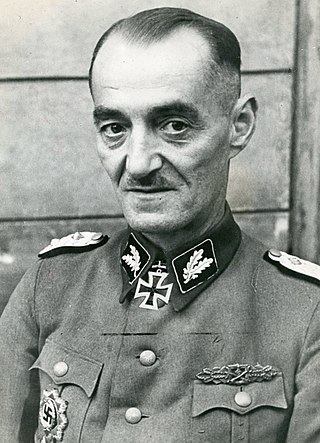
Oskar Dirlewanger was a German military officer (SS-Oberführer) known for his many and varied war crimes. He played a significant role as the founder and commander of the SS penal unit known as the "Dirlewanger" during World War II.
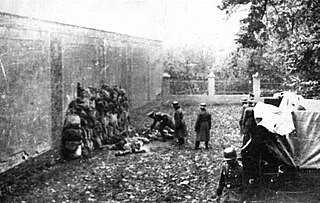
During World War II, the Nazi German Einsatzkommandos were a sub-group of the Einsatzgruppen – up to 3,000 men total – usually composed of 500–1,000 functionaries of the SS and Gestapo, whose mission was to exterminate Jews, Polish intellectuals, Romani, and communists in the captured territories often far behind the advancing German front. Einsatzkommandos, along with Sonderkommandos, were responsible for the systematic murder of Jews during the aftermath of Operation Barbarossa, the invasion of the Soviet Union. After the war, several commanders were tried in the Einsatzgruppen trial, convicted, and executed.
A Kommando is a general term for special police and military forces in German, Dutch, and Afrikaans speaking nations.

The Dirlewanger Brigade, also known as the SS-Sturmbrigade Dirlewanger (1944), or the 36th Waffen Grenadier Division of the SS, or The Black Hunters, was a unit of the Waffen-SS during World War II. The unit, named after its commander Oskar Dirlewanger, consisted of convicted criminals who were not expected to survive their service with the unit. Originally formed from convicted poachers in 1940 and first deployed for counter-insurgency duties against the Polish resistance movement, the brigade saw service in anti-partisan actions in German-occupied Eastern Europe.
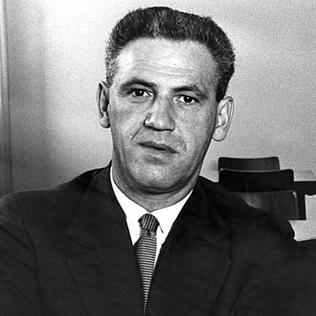
Filip Müller was a Jewish Slovak Holocaust survivor and Sonderkommando at Auschwitz, the largest Nazi German concentration camp during World War II, where he witnessed the murders of tens of thousands of people.

The Counter Intelligence Corps was a World War II and early Cold War intelligence agency within the United States Army consisting of highly trained special agents. Its role was taken over by the U.S. Army Intelligence Corps in 1961 and, in 1967, by the United States Army Intelligence Agency. Its functions are now performed by its modern-day descendant organization, United States Army Counterintelligence. The National Counter Intelligence Corps Association (NCICA), a veterans' association, was established in the years immediately following World War II by former military intelligence agents.
The Ritchie Boys were a special collection of soldiers, with sizable numbers of German-Austrian recruits, of the U.S. Military Intelligence Service officers and enlisted men of World War II who were used primarily for interrogation of prisoners on the front lines and counter-intelligence in Europe because of their knowledge of the German language and culture. Trained at secret Camp Ritchie in Washington County, Maryland, many of the total 22,000 service men and women were German-speaking immigrants to the United States, often Jews, who fled Nazi persecution. In addition to interrogation and counter-intelligence they were also trained in psychological warfare in order to study and demoralize the enemy, and served as prosecutors and translators in the Nuremberg trials.
The following outline is provided as an overview of and topical guide to World War II:

Flyer Command Iraq was a unit of the German Air Force (Luftwaffe) sent to Iraq in May 1941 as part of a German mission to support the regime of Rashid Ali during the Anglo-Iraqi War. The mission was part of a larger effort to gain support in the Middle East for the Axis Powers against the United Kingdom and its allies during World War II.
Luftwaffe is a generic German term for an air force. It may also refer to one of the following air forces:
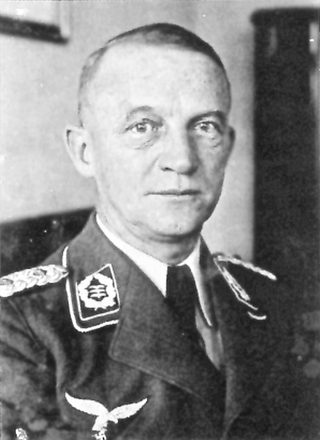
Hellmuth Felmy was a German general and war criminal during World War II, commanding forces in occupied Greece and Yugoslavia. A high-ranking Luftwaffe officer, Felmy was tried and convicted in the 1948 Hostages Trial.

Sonderkommando "Elbe" was the name of a World War II Luftwaffe task force assigned to bring down heavy bombers by ramming them in mid-air.

The Siebel ferry (Siebelfähre) was a shallow-draft catamaran landing craft operated by Germany's Wehrmacht during World War II. It served a variety of roles in the Mediterranean, Baltic and Black Seas as well as along the English Channel. They were originally developed for Operation Sea Lion in 1940, the cancelled German invasion of England. Siebel ferries continued performing after the war's end in 1945.

The Schutzpolizei des Reiches or the Schupo was the state protection police of Nazi Germany and a branch of the Ordnungspolizei. Schutzpolizei is the German name for a uniformed police force. The Schutzpolizei des Reiches was the uniformed police of most cities and large towns. State police departments were in charge of protection police, Kripo criminal investigation divisions (Kriminalpolizei), and administrative police. The state protection police comprised a patrol branch, barracked police, traffic police, water police, mounted police, police communications units, and police aviation. Policemen were required to have previous military service, good physical and mental health, Aryan descent and membership in the Nazi Party.
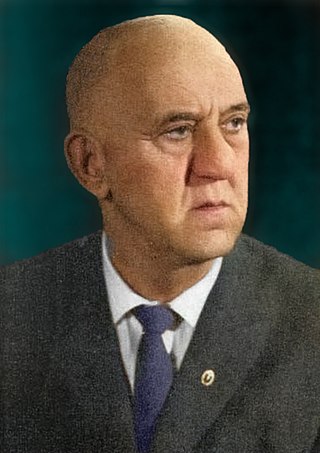
Karl Stumpp was a German ethnographer of Black Sea German origin who devoted himself to the study of Germans in Eastern Europe and Southeastern Europe, especially those from the lands of the former Russian Empire. Starting out as a pre-war academic and teacher, during the German-Soviet portion of World War II, he led Special Command Unit Dr Karl Stumpp, which had been named after him in honour of his prior work on Russian German ethnology. This operation sought to classify the inhabitants of ethnic German and Swedish settlements whom the Nazis favoured. It also classified those of other ethnicities including Ukrainians and Jews. In the postwar period, Stumpp escaped punishment for his wartime service to the Nazi regime. Instead, he returned to teaching and served as the long-time chairman of the Association of Germans from Russia, travelling to North America to visit and lecture to the Russian German diaspora communities there.












